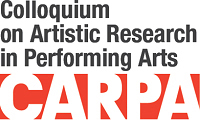CARPA4
 The Colloquium on Artistic Research in Performing Arts CARPA4 brought together 70 experts in their fields from 13 different countries to the Theatre Academy of the University of the Arts Helsinki on 10 – 13 June, 2015. Colloquiums theme was The Non-Human and the Inhuman in Performing Arts – Bodies, Organisms and Objects in Conflict.
The Colloquium on Artistic Research in Performing Arts CARPA4 brought together 70 experts in their fields from 13 different countries to the Theatre Academy of the University of the Arts Helsinki on 10 – 13 June, 2015. Colloquiums theme was The Non-Human and the Inhuman in Performing Arts – Bodies, Organisms and Objects in Conflict.
CARPA4 observed critically anthropocentrism in performing arts and wondered the meaning of objects and non-human extent in arts and artistic research. The theme was approached from different perspectives by the colloquium’s keynote speakers Professors Peta Tait, Timothy Morton, and Boyan Manchev.
CARPA is a biennual international colloquium that focuses on performance art and artistic research. The colloquium is organised by the Performing Arts Research Centre (Tutke) of the Theatre Academy of the University of the Arts Helsinki.
Proceedings of CARPA4, including articles from the accepted presentations, will be published in NIVEL – an open access web publication, by December 2015. We are happy to include different types of papers, presentations and workshop reports including images, video and audio clips in these proceedings of the colloquium.
CARPA4 was supported by Tieteellisten seurain valtuuskunta / Federation of Finnish Learned Societies.
KEYNOTE SPEAKERS
● Professor Peta Tait FAHA, La Trobe University, Australia
● Professor Timothy Morton, Rice University, USA
● Professor Boyan Manchev, New Bulgarian University
Program for Inhuman Theater, or The Monstrous Desire of the Things


